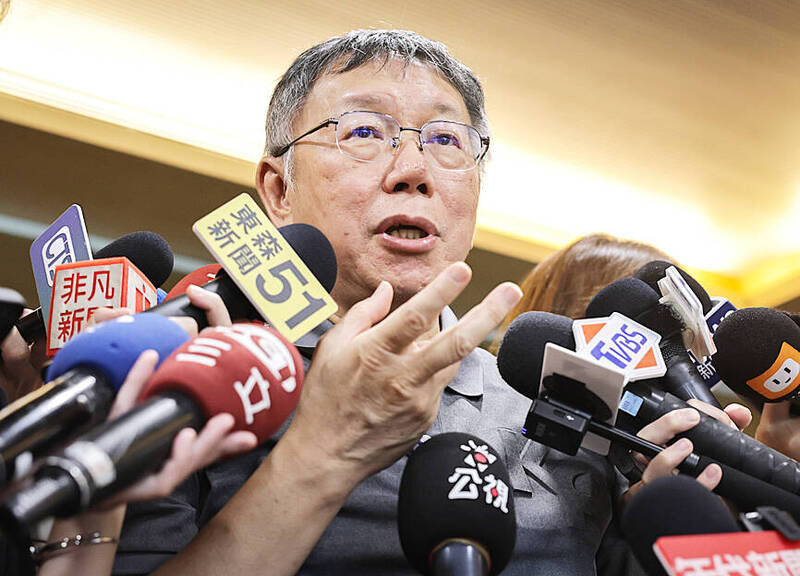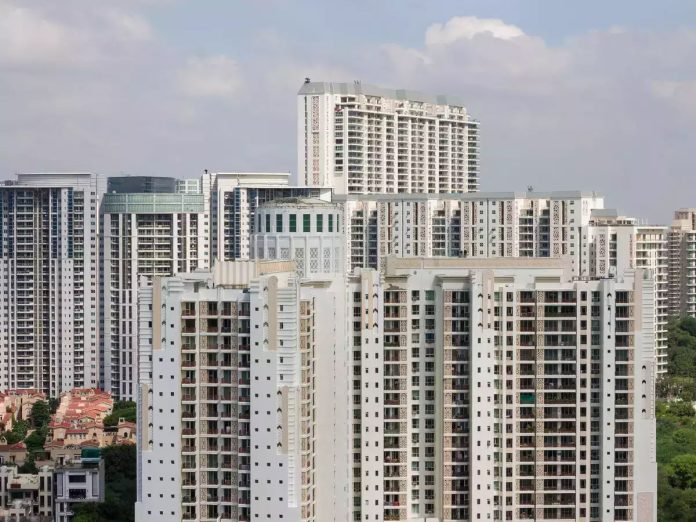Taiwan People’s Party Chairman Ko Wen-je speaks to reporters in Taipei on Saturday.Photo: CNA IMITATING OTHERS?Tsai Ing-wen’s office said the former president rents a commercial unit for her personal office and had never used election funds to purchase real estate By Lee I-chia / Staff reporter Taiwan People’s Party (TPP) Chairman Ko Wen-je (柯文哲) yesterday confirmed that he used about NT$43 million (US$1.35 million) from his presidential election subsidy to purchase an office unit near the Legislative Yuan in May.
Ko made the remarks after Democratic Progressive Party (DPP) Taipei City Councilor Lin Yen-feng (林延鳳) earlier in the day told a news conference that she received a tip-off that the TPP chairman had purchased a 48.76 ping (161.2m2) office unit at Jinan Building (濟南大樓), a commercial building in Taipei’s Zhongzheng District (中正).

Lin said that Ko purchased the unit on May 10, paying about NT$43 million in cash, and signed the property deed under his name. Citing Ko’s personal financial disclosure as a presidential candidate filed on Nov. 20 last year, Lin said Ko and his wife, Peggy Chen (陳佩琪), had only about NT$24.
64 million in savings and about NT$954,000 in other holdings, sparking questions about where he obtained the money to purchase the office unit. The office is close to the NT$120 million luxury apartment that Chen reportedly visited and was considering purchasing last month, Lin said. This has led to speculation on whether the couple had made false statements in their public disclosure or had received a huge sum of money.
“Where did the cash to purchase the office come from,” Lin asked, adding fire to recent speculation about discrepancies in the accounting reports on Ko’s election campaign’s political donations, election subsidy and funding from unknown sources. The TPP received about NT$110 million in election subsidies, which it in January said would be used for party operations, charity and visiting local communities to hear from voters, she said. If Ko had used the subsidy to purchase a property under his name, that would be going against his promise, she added.
Article 41 of the Presidential and Vice Presidential Election and Recall Act (總統副總統選舉罷免法) states that “if a pair of candidates received not less than one-third of the total vote, they shall receive a campaign expense subsidy of NT$30 per vote,” so Ko’s campaign received about NT$110 million, Lin said. Asked for comment, Ko said that according to the TPP’s rules — which he said were modeled after other political parties’ — two-thirds of a candidate’s election subsidy belongs to the candidate, so he used that portion of the subsidy to purchase the commercial unit to set up his personal office. He said he simply followed the practice of previous presidential candidates and set up a personal office.
TPP legislative caucus director Vicky Chen (陳智菡) said that Ko having a personal office is just like former president Tsai Ing-wen (蔡英文) having a personal office after stepping down as president and during her term as DPP chairperson. Tsai’s office later yesterday said that Tsai had never used her election subsidy to purchase any real estate, neither under her own name nor under any foundation. The offices for her foundation or personal office after she stepped down as president are rented, it added.
Chinese Nationalist Party (KMT) spokeswoman Yang Chih-yu said the party had a tight budget, so the presidential candidates’ election subsidy was all used on party expenses and party workers’ salary. President William Lai (賴清德) had announced that he would donate one-third of the candidate’s election subsidy to charity, one-third to caring for disadvantaged party founding members and subsidizing young party workers to study abroad, and one-third to the DPP. Additional reporting by CNA 新聞來源: TAIPEI TIMES 不用抽 不用搶 現在用APP看新聞 保證天天中獎 點我下載APP 按我看活動辦法.


















